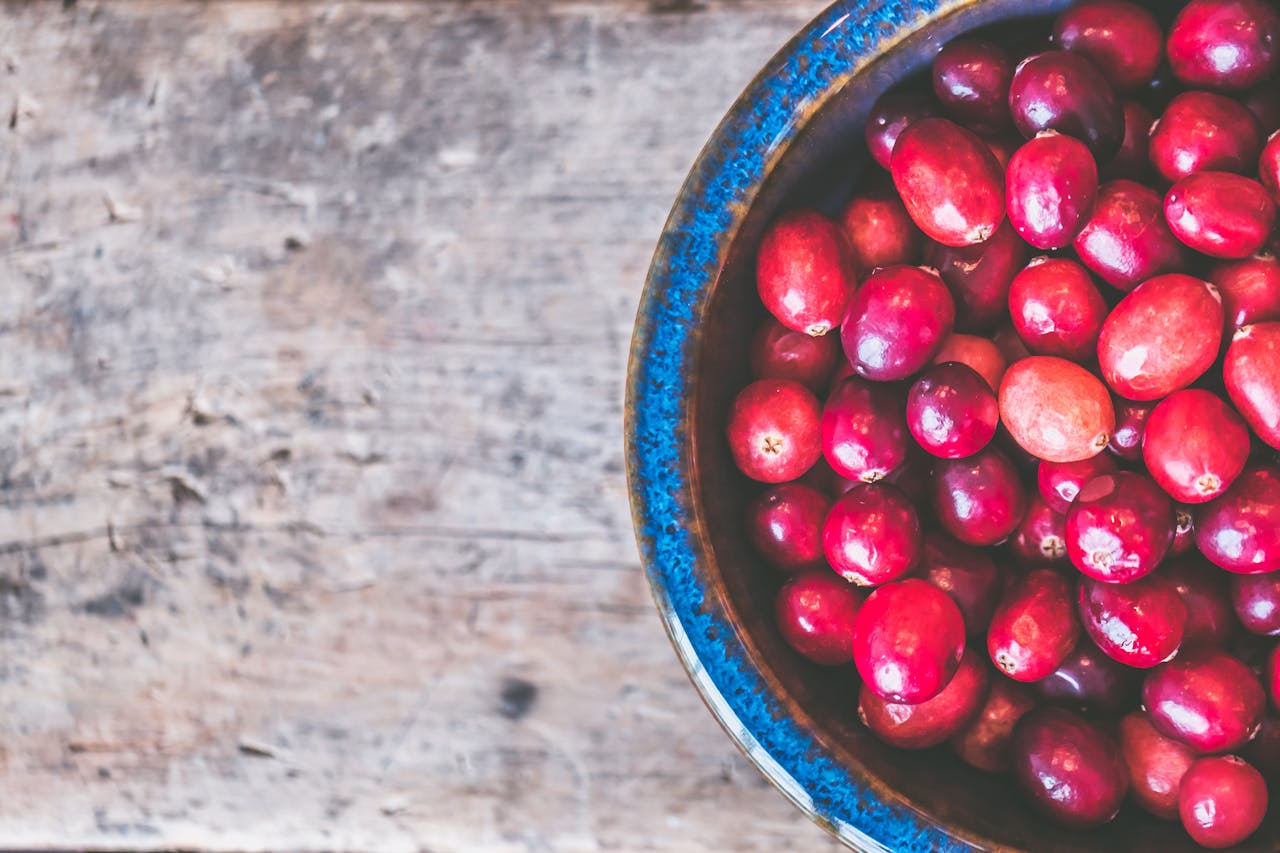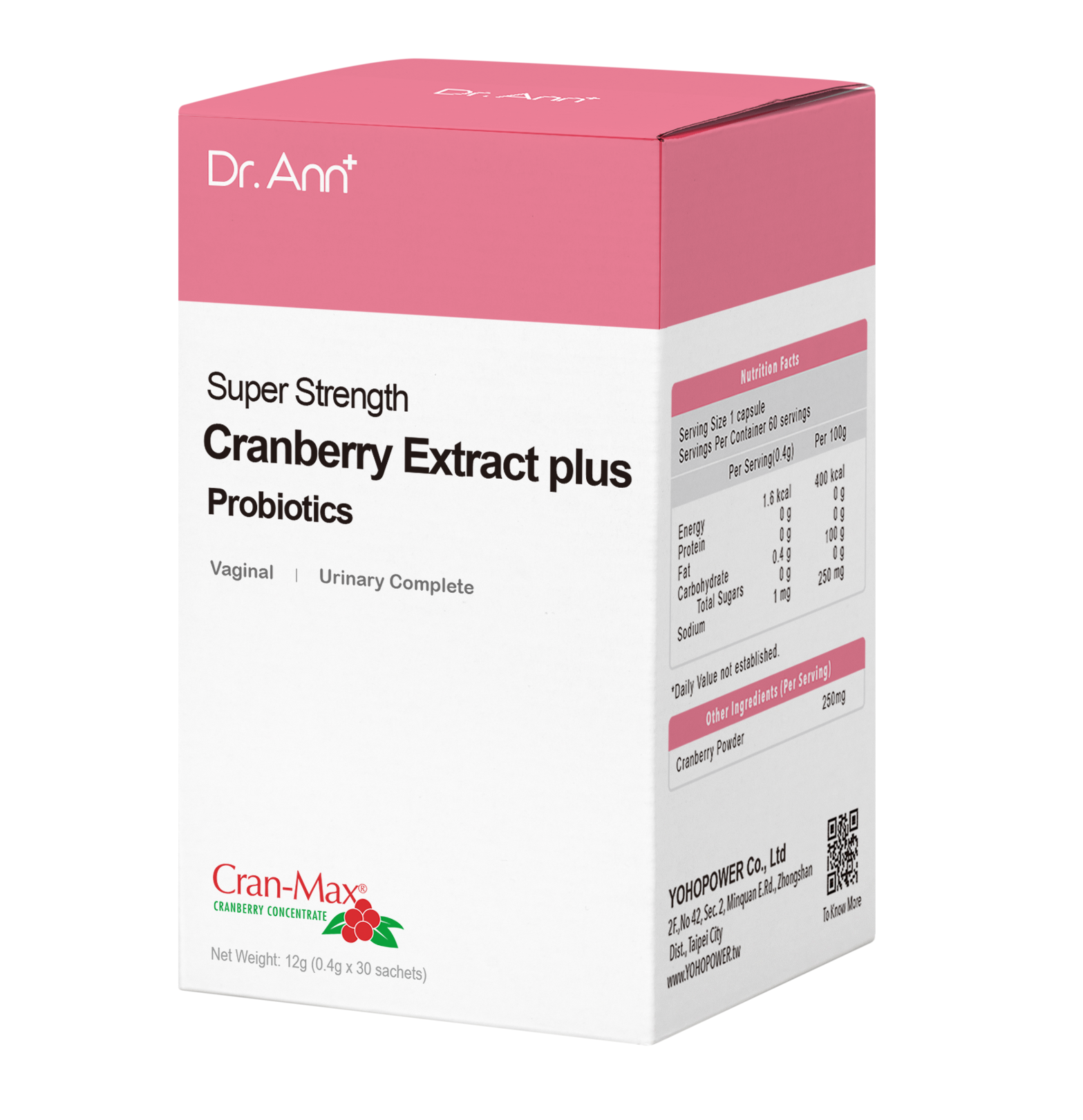Cranberries, small red berries native to North America, have gained popularity in Malaysia in recent years. Despite not being grown locally due to the tropical climate, Malaysians can find cranberries in various forms such as dried berries, juices, and supplements in supermarkets and health food stores. This guide will explore the benefits of cranberries and how Malaysians can incorporate them into their diets.
What are Cranberries?
Cranberries (Vaccinium macrocarpon) are bright red berries known for their tart flavor and numerous health benefits. While they can't be cultivated in Malaysia's tropical climate, imported cranberries have found their way into Malaysian households, health stores, and cafes.
How Malaysians Use Cranberries
In Malaysia, cranberries are gaining popularity for their versatility in the kitchen and potential health benefits. Health-conscious Malaysians are incorporating dried cranberries into their breakfast cereals, salads, and even traditional kuih for a nutritious twist. Cranberry juice has become a common sight in Malaysian homes and offices, particularly known for its benefits in urinary tract health. Moreover, the rising awareness of preventive healthcare has led to an increased interest in cranberry supplements among Malaysians, especially in urban areas like Kuala Lumpur, Penang, and Johor Bahru.
Nutritional Profile of Cranberries
Cranberries are packed with nutrients that contribute to their health benefits:
Antioxidants:
Cranberries are rich in flavonoids and polyphenols, including quercetin and myricetin. These compounds protect our cells from damage caused by free radicals.
Vitamins:
- Vitamin C: One cup of raw cranberries provides about 25% of the daily recommended intake. It's important for immune function and skin health.
- Vitamin E: Supports heart health.
- Vitamin K: Important for blood clotting and bone health.
Minerals:
- Manganese: One cup offers about 16% of the daily requirement. It's vital for bone health and metabolism.
- Copper and Potassium: Present in smaller amounts.
Fiber:
One cup of raw cranberries contains about 4 grams of fiber, which supports digestive health.
Low Calorie:
One cup of raw cranberries contains only about 46 calories.
Proanthocyanidins (PACs):
Cranberries contain a unique type of PACs that can prevent bacteria from sticking to the bladder wall.
It's important to note that while fresh cranberries offer the most concentrated nutritional benefits, dried cranberries and juices are more commonly available in Malaysia. However, these forms often contain added sugars, so it's best to look for low-sugar or unsweetened options.
Health Benefits of Cranberries
Cranberries offer several health benefits that make them a valuable addition to your diet:
1. Urinary Tract Health:
The PACs in cranberries help prevent harmful bacteria, especially E. coli, from sticking to the walls of the urinary tract. This can reduce the risk of urinary tract infections (UTIs).
2. Heart Health:
Regular consumption of cranberries may help improve cholesterol levels and lower blood pressure, potentially reducing the risk of cardiovascular diseases.
3. Anti-inflammatory Properties:
The antioxidants in cranberries, particularly quercetin, can help reduce inflammation in the body. This may offer protection against chronic conditions like heart disease and diabetes.
4. Oral Health:
Cranberries can inhibit the growth of bacteria responsible for tooth decay and gum disease, supporting overall oral hygiene.
5. Potential Anti-cancer Properties:
While more research is needed, some studies suggest that cranberries might help inhibit the growth and spread of certain cancer cells, particularly in breast, colon, and prostate cancers.
6. Digestive Health:
The fiber in cranberries supports regular bowel movements and promotes the growth of beneficial gut bacteria.
7. Blood Sugar Management:
Cranberries have a low glycemic index and may improve insulin sensitivity, potentially aiding in blood sugar management for those with or at risk of diabetes.
Cranberry Juice for UTI Prevention
Cranberry juice is particularly popular for its potential to prevent UTIs. For optimal UTI prevention, it's recommended to consume about 240-300 ml of cranberry juice daily. However, it's crucial to choose the right type of cranberry juice. Many commercial cranberry juices available in Malaysian supermarkets are actually "cranberry juice cocktails" that contain added sugars and other fruit juices. For maximum benefit, look for pure, unsweetened cranberry juice or low-sugar options.
It's important to note that while cranberry juice can be effective in preventing UTIs, it is not a treatment for existing infections. If you suspect you have a UTI, it's essential to consult a healthcare professional for proper diagnosis and treatment. For those who find the taste of pure cranberry juice too tart, cranberry supplements offer a concentrated form of cranberry's beneficial compounds without the added sugars often found in juices.
For More Read: The Dos and Don'ts of Using Cranberry Juice for UTI Prevention
Cranberry Probiotics: A Powerful Combination
In recent years, the Malaysian health food market has seen a surge in products combining cranberries with probiotics. This innovative combination harnesses the unique properties of cranberries and the gut-friendly attributes of probiotics, creating a synergistic effect that supports both urinary tract and digestive health.
Cranberry probiotics typically consist of cranberry extract or powder mixed with beneficial bacteria strains, most commonly Lactobacillus and Bifidobacterium species. The cranberry component continues to offer its anti-adhesion properties, helping to prevent harmful bacteria from clinging to the urinary tract walls. Simultaneously, the probiotic bacteria help maintain a healthy balance of microorganisms in the gut, which may indirectly support urinary health by promoting overall immune function.
When selecting a cranberry probiotic product, it's important to look for those with a sufficient amount of both cranberry extract and probiotic strains. High-quality products will specify the concentration of proanthocyanidins (PACs) from cranberries and the number of colony-forming units (CFUs) of probiotics.
Cranberry Supplements: Concentrated Benefits
As awareness of cranberry benefits grows in Malaysia, many health-conscious individuals are turning to cranberry supplements as a convenient and concentrated way to incorporate these benefits into their daily routines. These supplements come in various forms, including capsules, tablets, and powders, designed to provide a concentrated dose of the active compounds found in cranberries.
One of the primary advantages of cranberry supplements is their consistency in dosage. Unlike fresh cranberries or juice, where the concentration of beneficial compounds can vary, supplements are formulated to provide a standardized amount of active ingredients. This standardization allows for more precise control over intake, which can be particularly important for those using cranberries for specific health purposes, such as UTI prevention.
When choosing a cranberry supplement in Malaysia, it's crucial to look for products that clearly state the amount of PACs they contain. It's also worth noting that some supplements combine cranberry extract with other beneficial ingredients, such as vitamin C or D-mannose, to enhance their overall health impact.
Spotlight on Cranmax
In the world of cranberry supplements, Cranmax has emerged as a notable product gaining attention in the Malaysian health market. Cranmax is a patented, highly concentrated cranberry powder extract that's standardized to contain a specific amount of proanthocyanidins (PACs). What sets Cranmax apart is its unique manufacturing process, which concentrates the whole cranberry fruit, including the seeds and skin, to retain a fuller spectrum of cranberry's natural compounds.
The key advantage of Cranmax lies in its potency. Due to its concentrated nature, a smaller dose of Cranmax can provide an equivalent amount of active compounds found in a much larger volume of cranberry juice. This concentration makes it a convenient option for those seeking the benefits of cranberries without consuming large quantities of juice or multiple capsules of standard cranberry supplements.
Incorporating Cranberries into Your Diet
There are several delicious and creative ways to include cranberries in meals and snacks. Fresh cranberries, while not common in Malaysia, can be used in smoothies, cooked into sauces, or baked into muffins and cakes when available. Dried cranberries, which are more accessible, can be added to morning oatmeal, yogurt, salads, or mixed into trail mixes for a healthy snack.
For a local twist, consider adding dried cranberries to traditional Malaysian dishes like nasi lemak or incorporating them into kuih recipes. Cranberry juice can be enjoyed on its own, diluted with water, or mixed with other juices for a refreshing drink. In cooking, cranberry sauce can be used as a glaze for grilled chicken or fish, or as a unique dipping sauce for spring rolls.
For those who enjoy baking, dried cranberries can replace raisins in many recipes, adding a tart flavor to cookies, scones, and bread. They pair particularly well with white chocolate and nuts, making for delicious homemade energy bars or cookies.
Precautions and Considerations
While cranberries offer numerous health benefits, it's important to be aware of certain precautions. Individuals taking blood-thinning medications should consult their healthcare provider before significantly increasing cranberry intake due to its vitamin K content. Those prone to kidney stones should be cautious as cranberries are high in oxalates.
Diabetics and those watching their sugar intake should be careful with cranberry products, especially juices and dried cranberries, which often contain added sugars. Some people may experience digestive discomfort when consuming large amounts of cranberries, particularly in juice form.
While rare, cranberry allergies do exist. If you experience symptoms such as itching, hives, or difficulty breathing after consuming cranberries, discontinue use immediately and consult a healthcare professional. Pregnant or breastfeeding women should consult with their healthcare provider before significantly increasing cranberry intake or starting any new supplements.
When using cranberry supplements, be aware that they are not regulated as strictly as medications. Choose supplements from reputable manufacturers and look for products that have been third-party tested for quality assurance.
Conclusion
Cranberries, with their unique tart flavor and impressive array of health benefits, have rightfully earned their place in the Malaysian health and wellness landscape. Whether consumed fresh, dried, as juice, or in supplement form, cranberries offer Malaysians a versatile and beneficial addition to their diets.
As with any aspect of health, balance is key. Incorporating cranberries into your diet can be part of a holistic approach to wellness, complementing other healthy lifestyle choices such as a balanced diet, regular exercise, and adequate hydration. Remember, while cranberries offer numerous health benefits, they are not a magic solution. Always consult with healthcare professionals for personalized advice, especially if you have existing health conditions or are taking medications.
Dr.Ann Cranberry Extract Plus Probiotics Capsules
- High-Potency Cranberry Probiotics:
- Exclusive Sphere-Coat Technology
- Plant Capsules
- Pamper Girls Starting from Feminine Parts
- Double-Patented Experts Ensure Your Comfort All Day Long
- Cran-Max 500mg (2 capsules) patented cranberry extract+
- SecretCare 5 billion (2 capsules) patented Intimate probiotics






